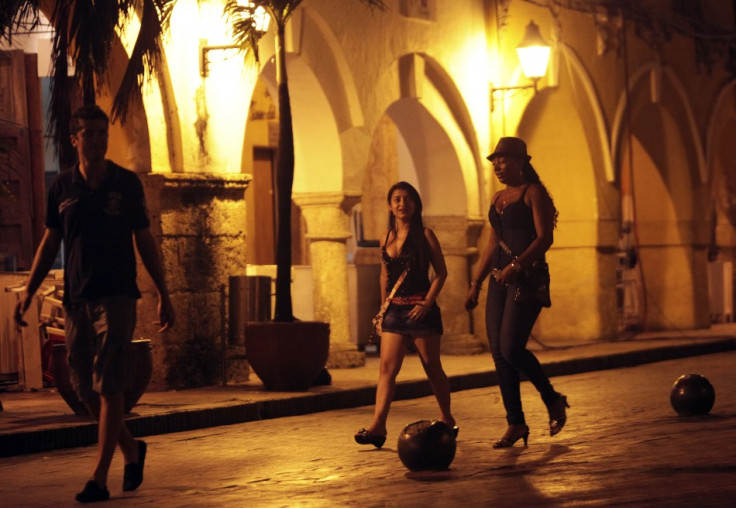Italian government wants to 'ghettoise' prostitution and turn itself into the world's biggest pimp
Dear Italy: Teaching boys how to use prostitutes won't solve your sex trafficking problem

Despite the fact that the legalisation of pimping and brothel-keeping has proven to be a failed experiment in Germany and the Netherlands, the Italian parliament is now seriously considering new legislation which seeks to follow their lead.
Legal proposals, including Bill No. 1201, the so-called 'Spilabotte Bill', would not only decriminalise pimping and brothel-keeping, it would also create legal "red light areas", criminalise those selling sex outside of these areas and require public registration and exorbitant fees from people in prostitution.
Alarmingly, it also proposes secondary school lessons for boys on how to "safely" use people in prostitution – not safe sex as part of ongoing sexual health education, but rather a new curriculum that essentially teaches young people that it is 'ok' to buy sexual access to another person if you have the money for it.
The legislation would enable the Italian government to become an effective 'pimp', profit from sex trafficking and sexual exploitation – both inherent parts of the commercial sex trade. It would provide a state-sanctioned veil over the extreme violence and abuse, which those selling sex regularly endure.
A victim of childhood sexual abuse – as many of those who sell sex often are, Heaven was 14 when she was trafficked by somebody she trusted. She was sexually exploited in an Italian brothel. Heaven reflects the voices of many when she says: "instead of shutting us in brothels and profiting from us... the state should put an end to this suffering".
The woman who lured Heaven into the sex trade was soon replaced by another, more violent, pimp, who continued to exploit and abuse her. She says: "he was obsessed with me because I was underage – one of the youngest in the brothel. He raped and punched me several times. I lived in terror and thought I couldn't escape from that world anymore".
He raped and punched me several times. I lived in terror and thought I couldn't escape from that world anymore
Adelina was kidnapped in Albania and trafficked into street prostitution in Italy for four years. While in street prostitution, she did not meet a single woman who was there voluntarily. Adelina was deported from Italy many times, but was always re-trafficked back into the country. On one occasion, she was even sold by an Albanian border guard.
Adelina eventually escaped and bravely testified against her traffickers, resulting in 40 of her abusers being imprisoned. She wants the Italian government to strengthen punishment against pimps and traffickers, rather than conceal, ghettoise and cause harm to people in prostitution.
Law and policymakers need to fully understand that you cannot make the sex trade 'safe' through introducing laws which do not recognise both its exploitative nature and the realities faced by girls and women like Heaven and Adelina. In Italy, the vast majority of those in prostitution are from disadvantaged backgrounds. The majority come from less economically developed countries such as Nigeria, Albania, Bulgaria, Hungary, Romania, Ukraine and China. Many have been trafficked, while all are constantly exposed to serious safety and health risks.
Italy's current financial crisis and austerity measures, which disproportionately affect women, are increasing Italian women's vulnerability to exploitation too. Many are unemployed or working in precarious, low-paying jobs. Treating prostitution as a state-sanctioned employment alternative for women with fewer resources could force even more of our society's most vulnerable into the sex trade.

Having founded IROKO in Turin in the late nineties to help victims of sex trafficking – particularly from my home country of Nigeria - I am acutely aware of the realities of the Italian sex trade. As is the case in many countries, most women and girls are promised well-paying jobs in Western Europe, but end up being sold into sexual slavery. They are told that they cannot escape unless they 'pay off' imaginary debts, which they are told they have racked up from being transported.
Traffickers regularly use psychological control to make sure that women and girls are terrified of going to the police to report what happened to them. They also fear for the safety and well-being of their family, which is a constant threat – even if they manage to ever leave the trade.
Treating prostitution as a state-sanctioned employment alternative for women with fewer resources could force even more of our society's most vulnerable into the sex trade.
Equality Now and our Italian partners Resistenza Femminista and IROKO are calling on the Italian government to reject any proposals which do not reflect the realities of prostitution and which do not promote the human rights of those who are trapped in the sex trade.
People in prostitution should never be criminalised or otherwise punished, and states should never promote and profit from their exploitation. Legalising pimping, brothel-keeping, trafficking and buying sex – or trying to move prostitution "indoors", doesn't make it safe or free from exploitation. This is a myth, as Equality Now's #ListenToSurvivors series and Resistenza Femminista's Voci di Sopravvissute consistently show.
Italy is also obligated by international and European law to combat trafficking and exploitation, including to reduce the demand that fuels exploitation. The proposed measures directly violate these legal obligations. Italian lawmakers should instead enact legislation which targets the root of the problem, by criminalising traffickers, pimps, brothel keepers and those who buy sex, while decriminalising and ensuring services and support for people in prostitution. Known as the "Nordic" or "Equality" Model, this approach is quickly gaining traction in Europe and beyond and has been shown to be the best solution for promoting equality and the enjoyment of full human rights by everyone.
Esohe Aghatise is an anti-trafficking consultant for Equality Now, an international human rights organisation dedicated to action for the civil, political, economic and social rights of girls and women.
© Copyright IBTimes 2024. All rights reserved.








